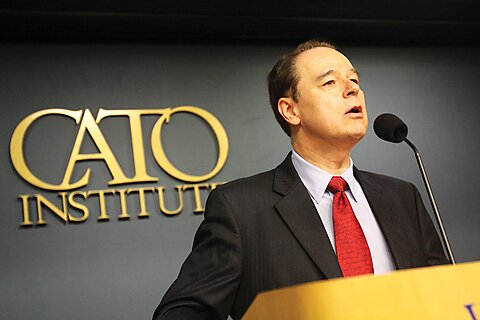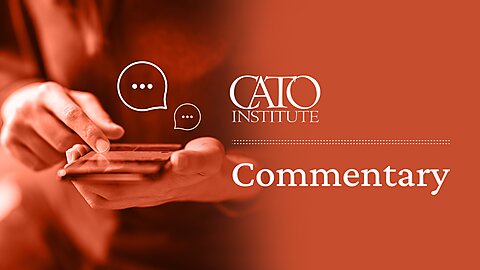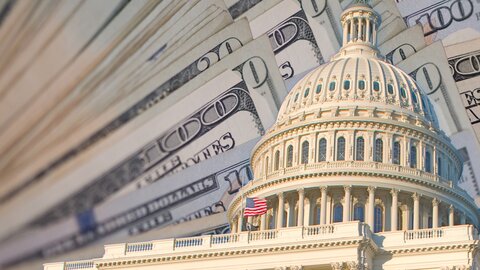
David Boaz, RIP: Reflections on a Great Libertarian, Friend, and Colleague
I was deeply saddened to learn today of the passing of my colleague and friend David Boaz, after his short battle with cancer. David has worked for the Cato Institute for 43 years and was a long‐serving vice president for public policy and executive vice president. In many respects, he was the Cato Institute, or at least came to be seen as synonymous with it. In his own right, he helped craft an answer to the question “what is libertarianism?’“ through his Libertarianism: A Primer, which was later updated to The Libertarian Mind. For his institution building and consistent propagation of core libertarian values, he has a claim to being one of the most influential libertarians of the past forty years.
Up until a couple of years ago, every Cato study or book that was published went through a “David Boaz review” prior to publication. This extra hurdle sometimes irked scholars, but we all came to appreciate the huge value added. David saw himself as a backstop to protect Cato’s institutional brand. Unlike some other think tanks, Cato does not have a “one voice” policy. But to the extent that our work consistently upheld libertarian principle, it was policed by David. His review ensured that a) what we were saying was actually compatible with libertarianism, b) the work was credible and serious, and c) for good measure, that there were no obvious grammar and spelling errors. He was an utter master in spotting even the tiniest mistakes.
When faced with questions about whether Cato should engage in a new venture or product line, David used to ask himself “What would the Brookings Institution do?” This wasn’t because he wanted Cato to cease advocating radical ideas, or to replicate Brookings. He just thought that for libertarian ideas to be taken seriously, they needed to be presented in a way that people in Washington DC would take seriously too. This included how staff presented themselves, such as how we dressed. And it meant Cato’s scholars not being unnecessarily rude or attacking the motives of politicians in public too. This earned him flak at times—the moniker “beltway libertarian” is now hurled as an insult for think tanks like Cato by some. But David cared little for that criticism. What he was interested in was preserving Cato’s reputation as a serious, principled, libertarian policy shop, something that was achieved in no small part because of his efforts.
When I was invited to interview at Cato, I approached a visiting fellow who I knew from the UK. His advice was clear: “The person you need to impress is David Boaz.” Yet David happened to be away the day I came to interview for eight hours in DC. I have always wondered if I’d have still gotten the job had I faced his apparently stern interview technique.
On my first day, I found a signed letter from David on my desk welcoming me to Cato, alongside a pile of books for me to read to get up to speed with the think tank’s history and ideas. He took me to lunch soon afterwards (not least, I think, to test if I’d read his Libertarian Mind!) and we’d continue that tradition every few months. He took a keen interest in all that I was doing and proved remarkably insightful on how to present economic issues in simple ways. Though not an economist, he always asked probing questions that tested the limits of your knowledge or reasoning and had sage advice for memorable turns of phrase. He also regularly cut out or printed articles that might be of interest for me to write about or respond to. This advice and guidance made me a better scholar.
David was incredibly adept at giving Cato employees a historical perspective about liberty and pushing back against “libertarian nostalgia.” Libertarians tend to believe, he would say, that Hayek’s Road to Serfdom was not a warning, but a description of the world. And, yes, there have been some very real erosions of our economic, civic, and social liberties as the government has grown this past century. But Justice Clarence Thomas really changed David’s perspective on the long sweep of progress towards liberal ideals. As David describes it:
The Cato Institute’s boilerplate description of itself used to include the line, “Since [the American] revolution, civil and economic liberties have been eroded.” Until Clarence Thomas, then chairman of the Equal Employment Opportunity Commission, gave a speech at Cato and pointed out to us that it didn’t seem quite that way to black people.
From then on he was always quick to point out the real progress in the spread of liberal ideals for the oppressed, both domestically and around the world, and to emphasize that libertarianism was not just defined by its economic policy stances.
My modal interactions with David were largely by email after the pandemic struck. And there were two genres of correspondence I received more than any other. The first was what I’d call the “Good blog but …” Boaz email. This would typically congratulate me on a blog post or op‐ed, before lamenting some turn of phrase that he considered a “Britishism” that didn’t translate well for an American audience.
The other genre was perhaps more surprising: David, despite being a proud American, with reverence for its constitution, history, and national success, was utterly obsessed by the British monarchy and aristocracy and would regularly ask me questions about them. These included: “Why was Elizabeth II never the Princess of Wales?”, “Why did X receive only an OBE and not a peerage?” and complex constitutional queries about the Parliamentary quagmire during the Brexit wars. He was an avid viewer of The Crown and would regularly ask about the veracity of the events portrayed.
One of the final times I saw David, I asked him why he seemed so interested in the British upper classes. He admitted that his intrigue stemmed from a deep and abiding curiosity for rules, norms, and conventions. And this really expresses how David himself exemplifies some of the cultural and political tensions that are perfectly compatible with being a principled libertarian.
David saw libertarianism as a more radical political philosophy within the broader family of “liberalism.” All true liberals, he thought, believed that government power had to be justified according to its role in protecting individual rights. Libertarians just went further in believing “the scope and powers of government should be constrained so as to allow each individual as much freedom of action as is consistent with a like freedom for everyone else.”
With the rise of authoritarianism on left and right, David was personally keen to see libertarians work politically with “free speech liberals” and “Reagan Republicans” to create a broadly liberal center. This did not mean he wanted libertarians to junk their principles for political expediency. In fact, I remember him being irked by Matt Zwolinski and John Tomasi’s book, The Individualists, which really sought to divide libertarians into “paleo‐libertarians (America first),” “left libertarians” and “bleeding heart libertarians.”
He responded on social media that he was an “actual libertarian,” meaning, I think, that while he wasn’t a nativist or leftist, he still didn’t want to compromise on his libertarianism by making peace with an expansive welfare state, as some bleeding hearts did. His preference for building a liberal center was thus more about recognizing that the biggest new threats to existing liberties today come from authoritarians. Libertarians needed allies for that fight, but that didn’t necessitate us becoming inherently less libertarian where strands of liberals could agree to disagree.
David personally fought for years for certain issues like the freedom for gay couples to marry and against the war on drugs. But his focus on these issues didn’t mean he was a left‐libertarian or put much heavier weight on social policy: for him, these were just quintessential libertarian issues—about extending fundamental rights to equal treatment under the law and personal consumption freedom.
Libertarians often get (unfairly) caricatured as atomized libertines. Yet David’s libertarianism went beyond getting government out of our lives to grant us the freedom to do what we want. Not only was he fascinated by those rules and norms that allow different free societies to flourish, but his personal values, observed by others over many years, were often quite “Victorian”—including a commitment to hard work, decency, honest dealing, decorum in public life and finding self‐reliant, non‐state familial and community solutions to problems. As such, he himself embodied what Shirley Letwin wrote of as the “vigorous virtues” that help make a free society work.
One of the things that made David special, at least in my dealings with him, was that in his major role at Cato he was able to set aside these personal views about politics in delivering on his central task of keeping the institute libertarian. He made a big intellectual contribution to spreading the ideas of libertarianism in his own right. But what he did behind the scenes in building and maintaining our institute was his true life’s work.
I shall miss his conversations and wisdom immensely, but am glad to have known him.
RIP.



